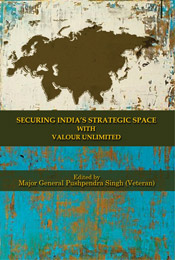Subjects
Recent View(s)
- Breaking Out of the Gree House: Indian Leadership in Times of Environmental Change
- Journey of a Geologist in TATA Steel
- Advances in ICT and the Likely Nature of Warfare
- The Anatomy of an Indian General Election
- Scaling India-Japan Cooperation in Indo-Pacific and Beyond 2025: Corridors, Connectivity and Contours
- Nation Branding in Non-Western Societies: Projecting India as a ‘Civilisation State’
Advances in ICT and the Likely Nature of Warfare
Kritika Roy
The Monograph on the theme “Advances in ICT and the Likely Nature of Warfare,” focuses on how advances in ICT have brought about a sea change in the way people work, live and share while also making them vulnerable. These advances exhibit a fundamentally reformed global context for development that has not just been restricted to the civilian domain but has simultaneously impacted the military domain. These advances offer unparalleled opportunities, risks and strategic options. The exponential pace of advances in the field of Artificial Intelligence (AI), robotics, big data, quantum computing or IoT (Internet of Things) pioneers a significantly different vision of work and society. The vision is rooted in, and hence naturally tends to propagate a form of an organisation embodying a more distributed power structure.
The current trends in warfighting present a very blurred picture of the future operating environment, but they give some shape to its likely direction. Military forces are trying to become much more flexible and have been adapting to these changes while emphasizing the importance of innovation and improvisation in order to counter challenges emanating from future scenarios. In this context, the monograph highlights the changing military strategies and tactics across nations vis-à-vis the hanging and emerging ICT technologies. It also highlights the importance of looking at present institutions, legal frameworks and principles as well as at the restraining factors inherent in realpolitik in order to understand if nation states are ready. The new means of waging war combined with ubiquitous cyber capabilities may currently seem less threatening to the body politic until the actual doomsday arrives.


 Political Science
Political Science

